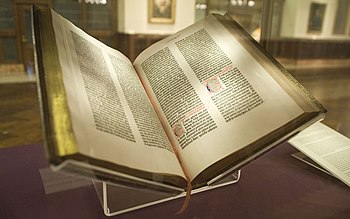Prior to the 15th century, knowledge, and therefore power was held in the hands of a few oligarchic institutions, chiefly the Roman Catholic Church. Most people were illiterate and the books that did exist were handwritten and copied by monks. Books were a rarity and were very expensive. With Gutenberg’s invention of the printing press in the late 1430s, Europe changed forever. The two adjectives I have chosen to describe this “impact of mass media” are revolutionary and enlightening, as I think they aptly illustrate how mass proliferation of ideas can change the status quo. By enlightening the common man, mass media has the power to cause a revolutionary change in power.
Such a revolution occurred with Martin Luther’s Protestant Reformation and I believe the success of that revolution absolutely coincided with the invention of the printing press and the dissemination of free thought throughout the Holy Roman Empire and Europe. To me, this has always been one of the greatest revolutions in history as it broke the power and influence of the Catholic Church, which had long barred scientific and philosophical progress. One of Martin Luther’s first tasks was to translate the Bible from Latin to German so that the common German could read it. Part of the Catholic dogma at the time was that salvation could only be reached through a Catholic priest. Luther’s refutation of the doctrine was heresy, but he had major issues with a multitude of Papal doctrines and ultimately, his Reformation was a success.
Unlike the religious revolution mentioned above, mass media can also have a dark side. Nazi propaganda is the perfect illustration of how the control and strategic manipulation of media can cause a terrible war and uncountable murders. By controlling the press and media, and using national pride as it’s cover, the Nazi Party brought about a highly organized and efficient regime united under some negative ideals. This of course led to World War II, the Holocaust, and the invention of the atomic bomb, in my opinion some of the darkest days in recent history.
On a lighter side, it is because of mass media that we are able to learn about these revolutions and perhaps lead our own. The printing press brought in a new era of knowledge and discovery, forever changing Western Civilization. In fact, a period in the 17th and 18th centuries was called “The Age of Enlightenment.” It was during this time that philosophers, musicians, scientists and theorists such as John Locke, Sir Isaac Newton, Voltaire, Mozart, Bach completed their seminal works and the time when our own American revolution was born. Many historians would agree with me in saying that the proliferation of ideas through newspapers and pamphlets throughout the colonies had a direct impact on popular support for revolution. Obviously this is relevant today as we are all citizens of the United States of America.
The future of mass media is interesting to contemplate. The transition from print to digital was relatively quick in historical perspective and it is becoming increasingly difficult to predict what will happen next. Obviously, the Internet is one of the most enlightening and revolutionary innovations ever. It has connected the entire world at blazing fast speed; it has caused revolutions such as the Arab Spring; it has put infinite encyclopedia’s worth of data at my fingertips. What are the limits of this technology and what does the future hold in store for us? We can only hope that this millennium will be as enlightening and revolutionary as the last.
-Roger Gant
11/29/12

